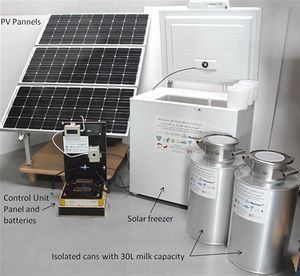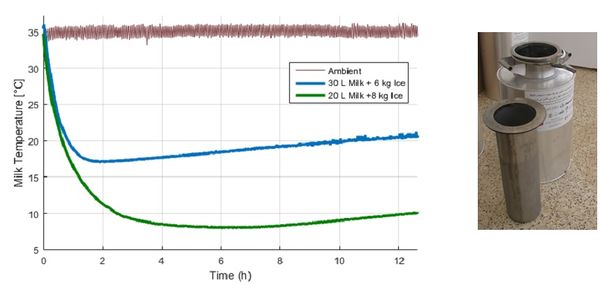Solar Milk Cooling with Insulated Milk Cans
Description
The milk cooling solution developed by the University of Hohenheim is based on a commercially available DC Refrigerator equipped with an adaptive control unit for its conversion to a smart ice-maker that operates depending on the availability of solar energy. The ice-maker has a volume of 160l and is capable of producing approx. 8-13 kg ice per day. One system includes 25 reusable plastic blocks of 2 kg capacity and two 30l isolated milk cans with removable ice compartment. To cool down 30l of milk from 36°C to 15°C in one of the supplied milk cans, the systems needs 6kg of ice and 90 minutes.
The smart ice-maker is powered by 600 Wp solar PV modules together with two batteries with a total capacity of around 1.5kWh. Thanks to the thermal energy storage, in form of the 25 2kg-Ice-blocks, the system is able to run autonomously for up to 7 days even during periods of low solar radiation and high ambient temperatures.
Ice-Maker with Adaptive Control Unit
The implemented adaptive control unit allows the efficient use of conventional DC-Refrigerators for a intensive and reliable production of ice all over the year. The ice-maker is equipped with following features:
- Variable compressor speed in dependence of solar radiation and state of charge of the batteries.
- Operation of a fan in the inner chamber in order to increase freezing rate.
- Energy saving mode during night and rainy days.
- Use of batteries to increase daily ice production up to 30%.
- Storage of 50 kg ice blocks to assure a autonomy of at least 5 days under low radiation or high ambient temperatures.
https://energypedia.info/images/d/de/Adaptive_control_unit_for_solar_ice_maker.jpg
Isolated Milk Cans
The milk-cans implemented are made of stainless-steel and have a capacity of 30 liter milk and 8 kg Ice. This allows a flexible use of them depending on the cooling requirements. The milk-can has been design to operate for two modes as described in following table.
|
|
30 Liter milk + 6kg Ice |
20 Liter milk + 8kg Ice |
|
Cooling temperature |
17°C after 90 min. |
Under 10°C after 150 min. |
|
Used for |
Transport of morning milk |
Storage of evening milk |
|
Milk quality preservation |
At least 6 hours |
At least 12 hours |
The cooling performance and bacterial growth were measured with real milk under lab conditions in a climate chamber. On-field milk quality assessments are currently carried out in order to confirm the potential of the system to retard bacterial growth depending on milk temperature and transport time under real working conditions.
Collaboration partners
Institute of Agriculture Engineering of the University of Hohenheim
Phaesun GmbH
International Center for Agricultural Research in the Dry Areas (ICARDA)
Tunisian Ministry of Agriculture (INRAT, OEP, CRRA)
German International Cooperation Agency (GIZ)
Supported by:
Innovation Transfer into Agriculture - Adaptation to Climate Change (ITAACC)
Powering Agriculture - Sustainable Energy for Food
German Ministry for Economic Cooperation and Development (BMZ)
On-field implementations
- Tunisia, July 2015 until December 2017:
10 solar systems of the presented milk cooling solution were installed in 7 farms in the region of Sidi Bouzid by the end of April 2016. Each system has a capacity of 60l per day while 3 farms were equipped with two system due to higher production volumes up to 120 liter milk per day.
The performance of the solar ice-makers is currently monitored in order to confirm the right use of the system by the farmers and the daily availability of 12kg ice. Additionally experts interviews are carried out for farmers and dairy industry to assets the acceptance of the milk-cans by daily use together with the social impact in terms of gender and labor organization.
From the economical side, the potential of the system to increase productivity and preserve milk quality will be analyzed as main pillars to support the milk value chain and generate business opportunities. Furthermore the system cost will be reduced by the development of milk-cans able to be produced locally.
https://energypedia.info/images/c/c6/Solar_Milk_Cooling_On_the_Field_in_Tunisia.jpg
Overview of solar milk cooling systems
References
Torres-Toledo, Victor, Klaus Meissner, Alberto Coronas, and Joachim Müller. 2015. “Performance Characterisation of a Small Milk Cooling System with Ice Storage for PV Applications.” International Journal of Refrigeration 60. 81–91. doi:10.1016/j.ijrefrig.2015.06.025.
Torres-Toledo, Victor. 2013. “MSc. Thesis: Design Methodology of Cost Optimized Solar Chillers for Milk Cooling in Rural Areas.” University Rovira i Virgilli, Tarragona, Spain.
For further information, please contact the author of this article.





















